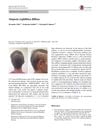 15 citations,
August 2019 in “Dermatologic Therapy”
15 citations,
August 2019 in “Dermatologic Therapy” Platelet-rich plasma (PRP) may help treat hair loss in patients with frontal fibrosing alopecia who don't respond to other treatments.
 15 citations,
May 2016 in “Archives of Dermatological Research”
15 citations,
May 2016 in “Archives of Dermatological Research” ULBP3 could be a marker for diagnosing alopecia areata incognita and may be linked to its cause and development.
 15 citations,
June 2011 in “British Journal of Dermatology”
15 citations,
June 2011 in “British Journal of Dermatology” No link found between aromatase gene and female hair loss.
 14 citations,
January 1985 in “International Journal of Dermatology”
14 citations,
January 1985 in “International Journal of Dermatology” The cause of alopecia areata was unknown, and while various treatments existed, no best treatment was agreed upon.
 13 citations,
June 2010 in “Journal of The American Academy of Dermatology”
13 citations,
June 2010 in “Journal of The American Academy of Dermatology” A man with Cronkhite-Canada syndrome had all 20 nails detach but improved with treatment.
 12 citations,
July 2017 in “Journal of cosmetic dermatology”
12 citations,
July 2017 in “Journal of cosmetic dermatology” Infrared thermography, especially with dermoscopy, improves accuracy in diagnosing active hair loss due to inflammation.
 12 citations,
June 2010 in “Journal of dermatology”
12 citations,
June 2010 in “Journal of dermatology” Some patients with severe alopecia areata developed skin darkening from their treatment, which may indicate a less effective response to the therapy.
 12 citations,
May 1995 in “Australasian Journal of Dermatology”
12 citations,
May 1995 in “Australasian Journal of Dermatology” Hair loss in women can be slowed with treatment, but more research needed for better solutions.
 11 citations,
January 2015 in “Current problems in dermatology”
11 citations,
January 2015 in “Current problems in dermatology” The conclusion is that treatments like finasteride and minoxidil can prevent baldness progression and improve hair density, but more research is needed on other therapies.
 10 citations,
August 2019 in “The World Journal of Men's Health”
10 citations,
August 2019 in “The World Journal of Men's Health” Kimchi probiotics slightly improved hair density, but more research needed.
 10 citations,
August 2018 in “Dermatologic Surgery”
10 citations,
August 2018 in “Dermatologic Surgery” Laser treatment improves hair density and increases growth factors in androgenetic alopecia.
 9 citations,
November 2012 in “Hepatology Research”
9 citations,
November 2012 in “Hepatology Research” A man lost all his hair permanently after hepatitis C treatment, a side effect not seen before.
 8 citations,
April 2013 in “Journal of The American Academy of Dermatology”
8 citations,
April 2013 in “Journal of The American Academy of Dermatology” Some breast cancer patients treated with high-dose docetaxel may experience permanent hair loss.
 8 citations,
January 1989 in “Annual Reports in Medicinal Chemistry”
8 citations,
January 1989 in “Annual Reports in Medicinal Chemistry” Hair loss from alopecia areata and androgenetic alopecia can be treated, but more effective and safer treatments are needed.
 7 citations,
January 2020 in “Journal of Dermatology”
7 citations,
January 2020 in “Journal of Dermatology” Cantu syndrome, which causes excessive hair growth and skin issues, is due to a mutation in the ABCC9 gene, and understanding this could help develop new treatments for hair diseases.
 6 citations,
March 2019 in “JAAD case reports”
6 citations,
March 2019 in “JAAD case reports” A new mix of anthralin and calcipotriene might help treat severe hair loss.
 6 citations,
January 2016 in “Annals of Dermatology”
6 citations,
January 2016 in “Annals of Dermatology” Human hair contains more glycosaminoglycans in children than adults, and these compounds decrease with age, possibly affecting hair thickness.
 6 citations,
April 2015 in “Infection”
6 citations,
April 2015 in “Infection” Treatment with benzylpenicillin and prednisolone cured the patient's syphilis and hair loss.
 6 citations,
October 2012 in “BMJ”
6 citations,
October 2012 in “BMJ” The woman's hair loss was mainly due to stress and low iron levels, and her hair grew back after treatment.
 5 citations,
June 2021 in “JAAD Case Reports”
5 citations,
June 2021 in “JAAD Case Reports” Platelet-rich plasma therapy may help treat folliculitis decalvans but benefits might not last without ongoing treatment.
 5 citations,
April 2019 in “Journal of The American Academy of Dermatology”
5 citations,
April 2019 in “Journal of The American Academy of Dermatology” Frontal Fibrosing Alopecia may be a complex condition linked to hormonal changes in women, not just a form of Lichen Planopilaris.
 5 citations,
July 2013 in “Our Dermatology Online”
5 citations,
July 2013 in “Our Dermatology Online” Lichen planopilaris is the most common type of scarring hair loss observed, with a variety of symptoms and tissue changes.
 5 citations,
February 2013 in “Dermatology and therapy”
5 citations,
February 2013 in “Dermatology and therapy” Crescina® lotion helps reduce hair loss and increase hair growth in males with androgenetic alopecia.
 4 citations,
May 1989 in “Journal of the Royal Society of Medicine”
4 citations,
May 1989 in “Journal of the Royal Society of Medicine” Crohn's disease can cause hair loss before other symptoms appear.
 3 citations,
October 2019 in “JAAD Case Reports”
3 citations,
October 2019 in “JAAD Case Reports” Two patients with lupus had an unusual type of hair loss not typical for the disease but improved with treatment.
 3 citations,
March 2018 in “BMC Cancer”
3 citations,
March 2018 in “BMC Cancer” Baldness, especially at the front, may lower the risk of testicular cancer by 31%, but its link to prostate cancer is unclear.
 3 citations,
July 2008 in “British journal of dermatology/British journal of dermatology, Supplement”
3 citations,
July 2008 in “British journal of dermatology/British journal of dermatology, Supplement” Terbinafine can cause hair loss.
 2 citations,
July 2022 in “Cureus”
2 citations,
July 2022 in “Cureus” A rare skin disorder affecting the face was found in a 28-year-old Saudi man.
 2 citations,
March 2019 in “Journal of Dermatology”
2 citations,
March 2019 in “Journal of Dermatology” Trichoscopy helped diagnose and treat a woman with two different types of hair loss.
 2 citations,
December 2007 in “Expert Review of Dermatology”
2 citations,
December 2007 in “Expert Review of Dermatology” The document concludes that early diagnosis and treatment are key for pediatric hair loss disorders, and addressing the emotional effects on children is important.






























